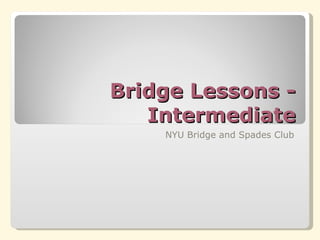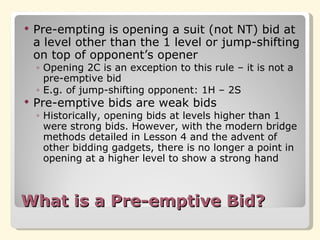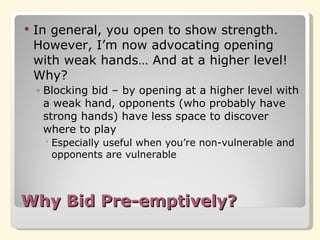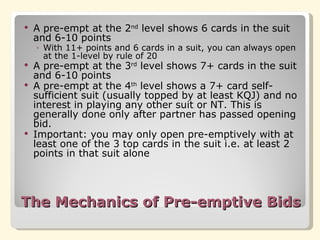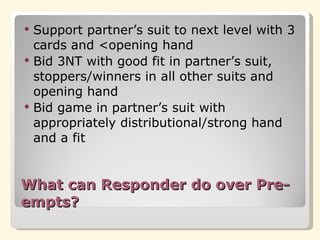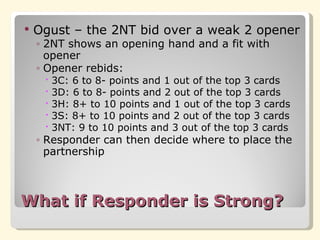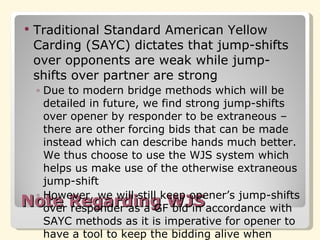Lesson 7 Pre Empting
- 1. Bridge Lessons - Intermediate NYU Bridge and Spades Club
- 3. What is a Pre-emptive Bid? Pre-empting is opening a suit (not NT) bid at a level other than the 1 level or jump-shifting on top of opponent’s opener Opening 2C is an exception to this rule – it is not a pre-emptive bid E.g. of jump-shifting opponent: 1H – 2S Pre-emptive bids are weak bids Historically, opening bids at levels higher than 1 were strong bids. However, with the modern bridge methods detailed in Lesson 4 and the advent of other bidding gadgets, there is no longer a point in opening at a higher level to show a strong hand
- 4. Why Bid Pre-emptively? In general, you open to show strength. However, I’m now advocating opening with weak hands… And at a higher level! Why? Blocking bid – by opening at a higher level with a weak hand, opponents (who probably have strong hands) have less space to discover where to play Especially useful when you’re non-vulnerable and opponents are vulnerable
- 5. The Mechanics of Pre-emptive Bids A pre-empt at the 2 nd level shows 6 cards in the suit and 6-10 points With 11+ points and 6 cards in a suit, you can always open at the 1-level by rule of 20 A pre-empt at the 3 rd level shows 7+ cards in the suit and 6-10 points A pre-empt at the 4 th level shows a 7+ card self-sufficient suit (usually topped by at least KQJ) and no interest in playing any other suit or NT. This is generally done only after partner has passed opening bid. Important: you may only open pre-emptively with at least one of the 3 top cards in the suit i.e. at least 2 points in that suit alone
- 6. What can Responder do over Pre-empts? Support partner’s suit to next level with 3 cards and <opening hand Bid 3NT with good fit in partner’s suit, stoppers/winners in all other suits and opening hand Bid game in partner’s suit with appropriately distributional/strong hand and a fit
- 7. What if Responder is Strong? Ogust – the 2NT bid over a weak 2 opener 2NT shows an opening hand and a fit with opener Opener rebids: 3C: 6 to 8- points and 1 out of the top 3 cards 3D: 6 to 8- points and 2 out of the top 3 cards 3H: 8+ to 10 points and 1 out of the top 3 cards 3S: 8+ to 10 points and 2 out of the top 3 cards 3NT: 9 to 10 points and 3 out of the top 3 cards Responder can then decide where to place the partnership
- 8. An Extension: Weak Jump-shifts So far we’ve only covered jump-shifting over opponents’ bids. Jump-shifting partner is a weak jump-shift (WJS), showing 2-5 points, 6+ cards and no support for other suits (if jump is at the 2 level), and 6-9 points instead if the jump is at the 3 level E.g. 1C – 2H shows 0-5 points, 6+ hearts, no support for other suits E.g. 1H – 3C shows 6-9 points, 6+ clubs, no support for other suits
- 9. Note Regarding WJS Traditional Standard American Yellow Carding (SAYC) dictates that jump-shifts over opponents are weak while jump-shifts over partner are strong Due to modern bridge methods which will be detailed in future, we find strong jump-shifts over opener by responder to be extraneous – there are other forcing bids that can be made instead which can describe hands much better. We thus choose to use the WJS system which helps us make use of the otherwise extraneous jump-shift However, we will still keep opener’s jump-shifts over responder as a GF bid in accordance with SAYC methods as it is imperative for opener to have a tool to keep the bidding alive when holding a GF hand

